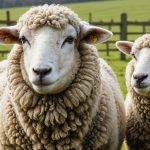Are you considering adding a unique companion to your rural UK home? Pet sheep can offer unexpected benefits beyond charming personalities and adorable appearances. These gentle creatures contribute to a sustainable lifestyle by aiding in natural lawn maintenance and providing wool. They also foster emotional well-being, serving as loving companions. This exploration reveals how welcoming a pet sheep can enhance your life in ways you might not have imagined. Discover the joys and advantages of sharing your space with these delightful animals!
Companionship Benefits of Pet Sheep
Exploring the emotional and social rewards of keeping sheep as companions can be enlightening.
Avez-vous vu cela : Essential Legal Guidelines for Owning a Pet Owl in the UK: What You Need to Know!
Emotional Benefits
Pet sheep offer unique forms of companionship and emotional support. Unlike traditional pets, sheep have a calming presence that can reduce stress and anxiety. Their gentle nature allows for a soothing environment, making them excellent companions for those seeking tranquility.
Social Interactions
Sheep provide ample opportunities for social interactions and bonding. Spending time with them can lead to meaningful connections, as they respond well to human attention. Engaging in routine activities like feeding or grooming enhances the bond between owner and sheep, creating a fulfilling companionship experience.
A voir aussi : Conserving the Elusive Scottish Wildcat: Key Challenges and Solutions
Comparison with Traditional Pets
When comparing sheep to traditional pets such as dogs or cats, their companionship qualities stand out. While dogs offer loyalty and cats provide independence, sheep bring a unique blend of calmness and presence. Here's a brief comparison:
| Traditional Pets | Pet Sheep |
|---|---|
| Loyal and active | Calm and gentle |
| Independent | Engaging |
| High energy | Soothing |
Sheep are particularly beneficial for individuals who prefer a more serene and steady form of companionship. Their ability to offer emotional support without demanding constant attention makes them an attractive alternative for those seeking a different kind of pet relationship.
Low Maintenance Care Requirements
Understanding the care needs of pet sheep is crucial for potential owners.
Essential Care Needs
Pet sheep are known for their low maintenance requirements, making them an attractive option for those new to livestock management. They need basic provisions such as a secure shelter, fresh water, and a balanced diet. Regular health checks and vaccinations are essential to ensure their well-being. Unlike some animals, sheep do not require extensive grooming, which simplifies their care routine significantly.
Time and Resource Efficiency
Compared to other livestock, sheep are relatively low maintenance. They thrive on pasture, reducing the need for expensive feed supplements. This not only saves time but also minimizes the resources required for their care. The simplicity of their needs allows for efficient management, making them suitable for individuals with busy lifestyles.
Integration into Daily Routines
Incorporating sheep care into daily routines can be seamless. Here's how:
- Morning: Quick check of water supply and a brief health inspection.
- Afternoon: Ensure they have access to pasture or feed.
- Evening: Secure them in a shelter and perform a final check.
This structured approach ensures that sheep remain healthy without demanding excessive time or effort. Their low maintenance nature makes them an ideal choice for those seeking a manageable and rewarding pet experience.
Sustainable Land Management
Exploring eco-friendly practices with sheep can revolutionize land management.
Role of Sheep in Natural Land Maintenance
Sheep play a vital role in sustainable farming by naturally maintaining landscapes. Their grazing habits help control weeds, reducing the need for chemical herbicides. This form of land management is both effective and environmentally friendly, offering a harmonious way to maintain pastures.
Benefits of Grazing in Controlling Weeds and Promoting Biodiversity
The grazing patterns of sheep contribute significantly to biodiversity. By selectively feeding on certain plants, they prevent the overgrowth of dominant species, allowing a variety of plants to flourish. This natural balance supports a diverse ecosystem, enhancing the sustainability of the land.
- Weed Control: Minimizes invasive species
- Soil Health: Promotes natural fertilization
- Ecosystem Balance: Encourages varied plant life
Long-term Environmental Advantages of Keeping Sheep
Keeping sheep offers numerous long-term environmental benefits. Their ability to convert pasture into valuable nutrients supports soil health, promoting eco-friendly practices. This sustainable approach to land management not only preserves the environment but also enhances the productivity of the land over time. By integrating sheep into farming practices, landowners can achieve a more balanced and sustainable ecosystem.
A quote from a sustainable farming expert encapsulates this: "Sheep are nature's gardeners, maintaining balance and fostering biodiversity effortlessly."
Economic Advantages of Owning Sheep
Exploring the financial benefits of sheep ownership can reveal significant opportunities.
Cost Savings and Agricultural Benefits
Owning sheep can lead to substantial cost savings in lawn care. Their natural grazing habits reduce the need for mechanical mowing and chemical treatments, offering an eco-friendly alternative. This not only saves money but also promotes sustainable land use.
Sheep farming presents numerous agricultural benefits, such as the potential for wool or meat production. Wool can be a valuable commodity, providing an additional income stream. Similarly, raising sheep for meat can support local food supply chains, enhancing the economic viability of small farms.
Financial Implications Compared to Other Pets
When considering the financial implications of keeping sheep versus traditional pets, sheep can be more economical. Here's a comparison:
| Aspect | Sheep | Traditional Pets |
|---|---|---|
| Lawn care savings | Significant | None |
| Wool/meat production | Possible | Not applicable |
| Initial investment | Moderate | Varies |
Sheep require fewer resources and offer potential agricultural benefits that traditional pets do not. This makes them a financially prudent choice for those interested in both companionship and economic returns. By understanding these cost savings and benefits, prospective sheep owners can make informed decisions aligned with their financial goals.
Care Integration into Family Life
Exploring how pet sheep can become a part of family routines and rural living.
Introducing Sheep to Children and Other Pets
Integrating pet sheep into family life can be a rewarding experience, especially in a rural living setting. Introducing sheep to children can foster responsibility and empathy. Start by involving children in simple tasks like feeding and checking water supplies. This hands-on approach helps them understand the needs of their new companions.
When it comes to other pets, gradual introductions are key. Allow your existing pets to observe the sheep from a distance initially, then slowly bring them closer under supervision. This careful introduction can help establish a peaceful coexistence.
Daily Routines and Interaction
Incorporating sheep into daily routines can enhance family life. Establish a schedule that includes morning and evening checks, allowing family members to bond with the sheep. This routine not only ensures the animals' well-being but also strengthens family ties through shared responsibilities.
- Morning: Feed and water check
- Afternoon: Supervised playtime
- Evening: Secure shelter and health assessment
Personal Anecdotes from Families
Families with pet sheep often share heartwarming stories of how these animals enrich their lives. One family noted, "Our sheep have become part of our daily rhythm, teaching our children about care and commitment." These personal experiences highlight the joy and fulfillment that pet integration can bring to family life.
Regulations and Local Considerations
Exploring the framework for responsible sheep ownership in the UK.
Overview of UK Regulations
In the UK, owning pet sheep requires adherence to specific livestock regulations. These rules ensure the well-being of the animals and the safety of the community. Sheep owners must register their flock with the Department for Environment, Food & Rural Affairs (DEFRA). Compliance with UK laws also involves maintaining accurate records of animal movements and health statuses.
Key Considerations for Rural Living
Living in rural areas offers unique opportunities and challenges for sheep ownership. It's essential to consider community acceptance and local livestock regulations. Neighbors should be informed about your plans to keep sheep, as their presence can affect local dynamics. Understanding zoning laws and ensuring that your property meets all UK laws for livestock is crucial.
- Community Engagement: Inform and involve neighbors
- Zoning Compliance: Verify property suitability
- Animal Welfare: Prioritize sheep health and safety
Resources for New Sheep Owners
For those new to sheep ownership, several resources can help ensure compliance with livestock regulations. DEFRA provides guidelines on UK laws related to animal health and welfare. Local agricultural offices often offer workshops and support networks for new sheep owners, fostering a community of responsible and informed individuals. Accessing these resources can ease the transition into responsible sheep ownership.










